Crane takes a bow
Lee-Ann Crane started with the RDEK as its receptionist and retired as its CAO
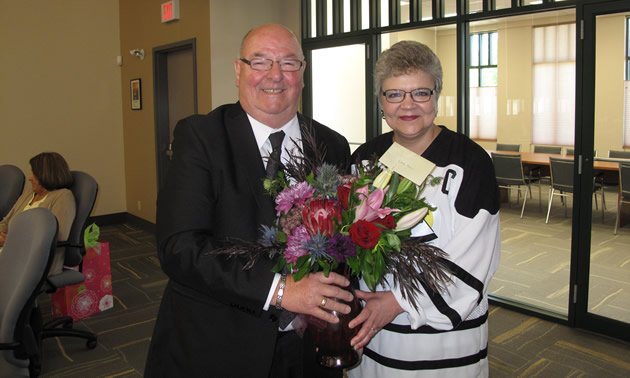
Elkford mayor Dean McKerracher offers congratulations to RDEK CAO Lee-Ann Crane on her retirement after 37 years with the Regional District of East Kootenay. — Photo courtesy RDEK
Lee-Ann Crane, who retired in May 2016, has spent her entire working life employed by one organization: the Regional District of East Kootenay. Crane started as the office receptionist at the age of 16 and filled several posts through the years. Since 1998 she has headed the administrative team, holding the title of chief administrative officer from 1998 until 2016.
In early spring of 2016, Crane kindly answered our questions, summarizing her career in her own words. The gist of her answers is reproduced below.
1. You mentioned you're working on the RDEK's five-year financial plan. Can you tell us in broad strokes the main focus of that plan?
The financial plan sets out capital and operating revenue and expenses for the next five years for the RDEK’s more than 100 services. We take into consideration what is needed for our normal day-to-day work to meet our legal obligations and complete projects that the Board has assigned to us. The efficient, cost-effective process that we have developed has earned the confidence of the Board, and I hope the public as well.
I have to say it was a bit emotional on March 4 when the Board adopted what will be my last financial plan. However, I leave knowing that with the strength and diligence of the management team and the strength and guidance of the RDEK Board, the financial planning process will continue to be effective.
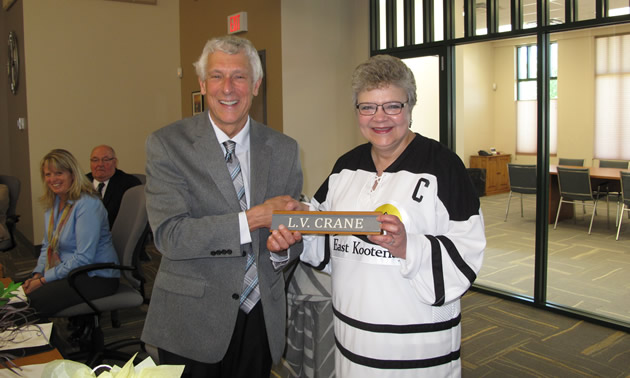
At CAO Lee-Ann Crane's last board meeting before her retirement, RDEK board chair Rob Gay presented her with her name plate as a keepsake. — Photo courtesy RDEK
2. Can you tell us about your career with the RDEK?
I started with the RDEK on July 16, 1979, at 16 years of age. I had worked there briefly through a job experience program sponsored by Mt. Baker School and thoroughly enjoyed my two weeks, so when the clerk-stenographer 1 (receptionist) job opened I jumped at the chance. A year later I advanced to clerk-stenographer 2, and in 1983 I was promoted to accounting clerk/computer operator. I had no formal training in accounting, but I spent six years in that position and then received a promotion to deputy treasurer, a position I held for one year.
While I enjoyed working with numbers, I was anxious to return to administrative-type work. So when the deputy secretary (now referred to as the deputy corporate officer) position opened, I immediately applied, and was given that position on September 1, 1990. I was excited to immerse myself in the world of interpreting legislation, writing bylaws and policies, and drafting letters and reports. Taking on my first management role was scary. I read about management, took courses and studied the habits of other good managers, all of which greatly assisted me.
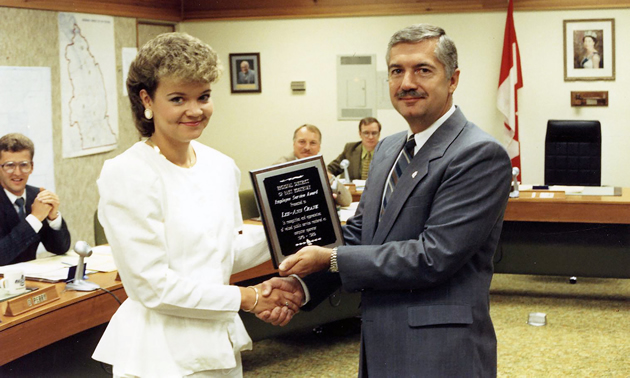
Lee-Ann Crane receives a plaque from Jim Ogilvie, RDEK chair at the time, recognizing her first 10 years of service to the RDEK. — Photo courtesy RDEK
On May 1, 1995, my job was reclassified to deputy secretary/administrator. My responsibilities increased and I took on more of the duties of the administrator (now called the CAO) when he was away. I learned and modified my approach to management, and without even knowing it, developed my leadership skills.
In 1998, when the administrator announced his retirement, I talked to him about the job and in the end decided to apply (obviously). Honestly, I surprised myself when I made that decision, as I had never aspired to lead the organization and was quite happy as deputy. Lo and behold, I was offered the job and became administrator on September 1, 1998. The title was changed to chief administrative officer in about 2002.
I always enjoy looking back over my years with the RDEK. I am grateful for the opportunities that Wayne McNamar, the former administrator, provided for me, and to all of the RDEK employees who supported me through the years. I am often asked what it takes to be an effective CAO and my answer is always the same: you have to surround yourself with good people. I am proud of every RDEK employee, of what they've accomplished and of their dedication to the organization and our public.
3. Please tell us about some challenges you faced during your rise through the ranks.
I faced a few challenges, generally fairly minor, but am only going to mention one: overcoming shyness. To this day I am grateful to those people who took me under their wing and helped me come out of my shell. A big help was my involvement with the Municipal Officers' Association (now known as the Local Government Management Association). The people I met and the guidance I received were invaluable, and being involved with that organization is still very important to me.
More importantly, I would like to talk about a few of the highlights of my career. The first and foremost highlight is the amazing people with whom I have worked. The staff at the RDEK are fantastic people, dedicated to their jobs, trying their best every day and accomplishing so much by working as a team. The boards that I've had the privilege to work with show their dedication to the people of the region with every decision.
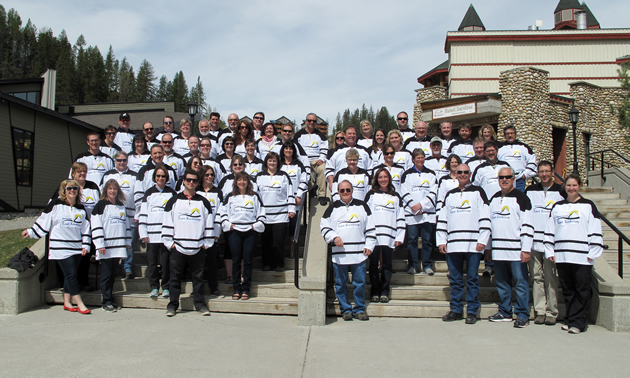
Lee-Ann Crane will treasure her memories of the support and teamwork demonstrated by the RDEK staff during her 37 years with the organization. — Photo courtesy RDEK
Coming up with creative solutions to help advance services in the region, to streamline process or to help members of the public were all highlights for me and very fulfilling. The last highlight I will mention is the honour and privilege it has been to have served our region’s residents and property owners.
4. We’d like to know about the important changes you've seen over the course of your career.
Over the 37 years I have witnessed improvements in the relationship between our electoral areas and municipalities. There is more of a spirit of co-operation and an understanding that everyone has to work together for the betterment of the region. This is reflected at the board and council level but is also apparent in the good staff-to-staff relationships we have with our municipalities.
Anyone who has been in the workforce for 37 years will probably say that technology has had the most profound impact on the way we do business. I consider it both a blessing and a curse. When I started, besides the phone system and electric typewriters, the RDEK had one photocopier. Then came the fax machine, word processors, desktop computers, scanners, email, websites, social media, etc., etc.
Technology has definitely helped to speed up some processes, and we were able to change to paperless agenda packages, which saved about 1,200 pounds of paper every year. However, technology also brought with it the demand for information to be available instantly, which adds stress to everyday work.
The way the RDEK has changed and improved communications is very important to me. We have been able to earn trust through communication and have increasingly included our permanent and seasonal residents in processes and issues that have a direct impact on their lives and livelihoods.
The change that is most important to me is the way the organization has developed a good reputation and is a place where people want to work. It has been inspiring to lead this great group of people who work together as a team.
5. How do you plan to spend the first year of your retirement?
I’ll spend the first year figuring out what it means to be retired. I have one commitment to fulfill from my time on the Cranbrook & District Community Foundation Board and that is to finish their policy work. I definitely will be spending more time with family and friends, but other than that I'll wait and see what the future holds.

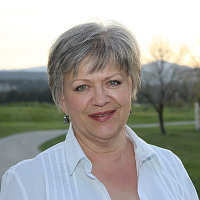




Comments